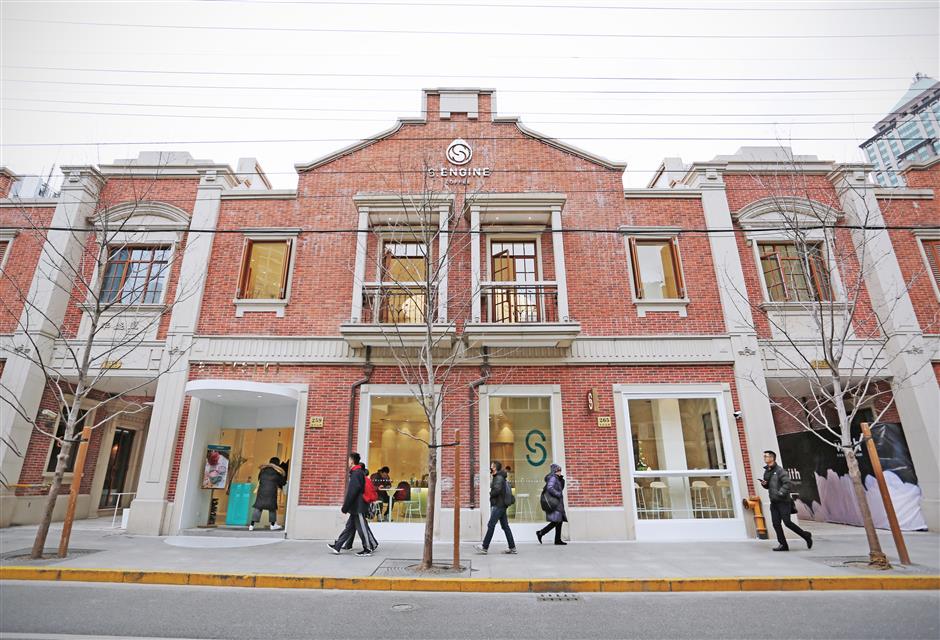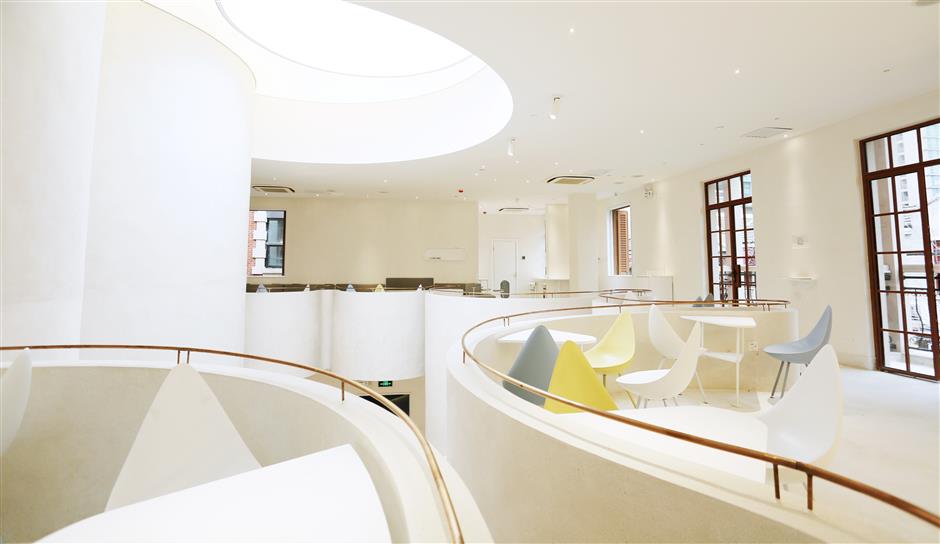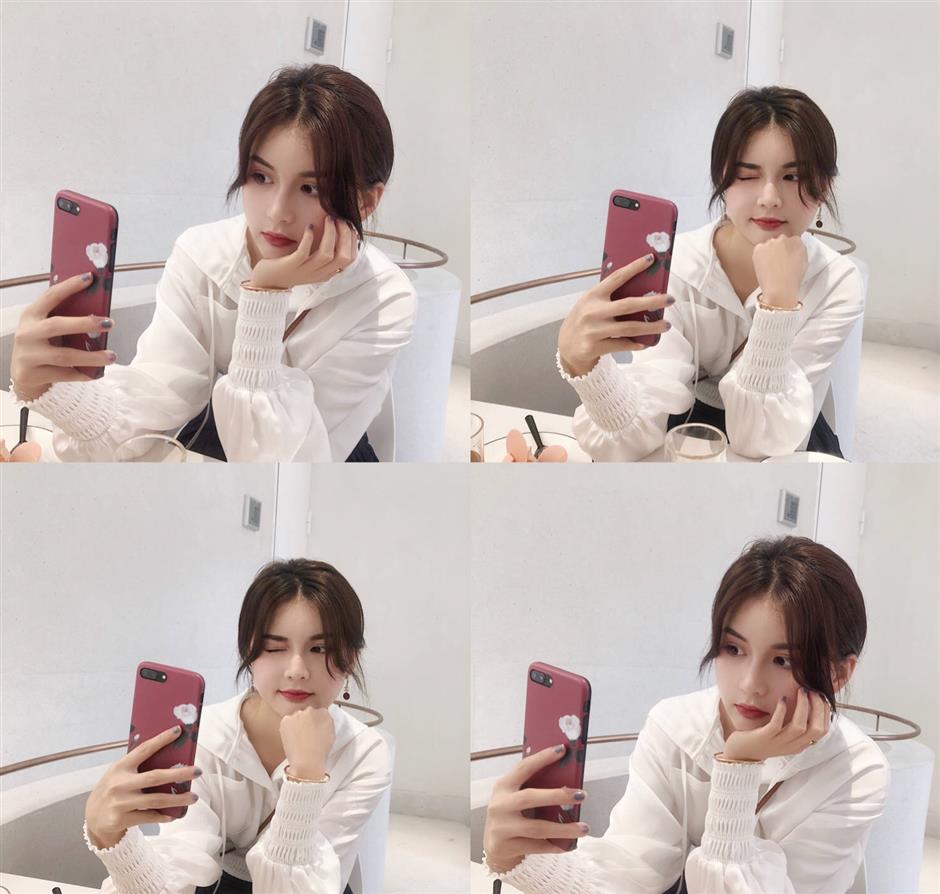Coffee becomes a little more special
Tiffany Ma is a frequent visitor to the S.Engine coffee shop in Feng Sheng Li, a new commercial landmark on Maoming Road N. that is similar to Xintiandi. A combination of Baroque and shikumen (stone gate) styles, the space has become a wanghong (Internet celebrity) cafe almost overnight, thanks to people like Ma.
The 23-year-old fashion blogger has over 200,000 followers on her social media accounts Weibo and Xiaohongshu, a lifestyle platform where people share their experience of new cosmetics, the latest fashion items, travel and trendy venues.
“If we post something very popular and catch the eyes of the followers, we call it ‘growing grass’ (zhongcao), and when they really visit the places or buy the items we recommend, it’s called ‘weeding’ (bacao) which means they ‘pull out the grass’,” she says.
Ma broadcast live her latest visit to S.Engine where she ordered a mocha latte and cheesecake. “The ambience, design and even what you drink and eat are very important,” says Ma. “It represents your taste and lifestyle. It’s not just about a cup of coffee.”
The coffee shop Ma visited is part of a local speciality coffee chain that started in Xintiandi in early 2017. Now it has three stores in Shanghai.

S.Engine’s Feng Sheng Li outlet is housed in a shikumen-style house.

The interior design is elegant yet chic.
Chic coffee shops like S.Engine are increasingly becoming a destination for many young people to take selfies or show off their taste.
“They are very sensitive to trends, that’s why speciality coffee shops become so popular now,” says Ma.
“Not all is speciality coffee, and the concept should also not be confused with ‘gourmet’ or ‘premium’ coffee,” says Robert Wang, founder of S.Engine.
The term “speciality coffee” was first used in 1974 by Erna Knutsen in an issue of Tea & Coffee Trade Journal. Knutsen used the term to describe beans of the best flavor. Speciality coffee refers to the whole process from farmer to cup using single origin coffee. It refers to the way the coffee is roasted and how it is extracted.
According to the Speciality Coffee Association of America, coffee which scores 80 points or above on a 100-point scale is graded “speciality.” Speciality coffees are grown in special and ideal climates, and are distinctive because of their full cup taste and little to no defects. The unique flavors and tastes are a result of the special characteristics and composition of the soil in which they are produced.
More and more such cafes in Shanghai are teaching local people how to taste speciality coffee, as well as the lifestyle behind it.
“The letter S in our brand refers to ‘speciality, social and soul,’ and the later two reveal the core of the lifestyle behind speciality coffee,” said Wang.
“At the same time you know how to enjoy a cup of speciality coffee, and your desire for a social life, need for space and attitude toward work and life will keep at the same level of high quality,” Wang defines and describes the lifestyle relevant to speciality coffee.

A S.Engine staffer (right) teaches a customer how to distinguish coffee beans and taste specialty coffee.
Seeing this trend, Wang says there will be three more new stores opening in Shanghai by November, including a third in Xintiandi.
He is very confident of the market.
“The first time I drank a good coffee, I made up my mind to make a good coffee,” he says. “However, the success of a coffee brand needs a professional market strategy and long-term plan, in addition to a passion for coffee itself.”
According to a survey by social media “Ka Men” (Coffee Door) in collaboration with food delivery app Meituan in 2016, there were 100,000 coffee shops in China, and increasing at 15 percent a year, though many went bankrupted a short time after opening.
“The competition is definitely very fierce, but the future of the coffee industry in this country is very exciting — the customers are increasing at a high speed even hard to estimate,” says Wang.
China is widely considered as a tea country, but there is little conflict as local people have already started to accept a lifestyle that includes coffee.
“I remember when I was a little child, my parents started to treat home visitors to instant coffee,” says Zheng Ying, a 34-year-old bank manager. “This was my first impression on coffee, and I still remember the brand Nestle.”
Zheng is used to life with coffee — a cup of Americano is a must-have on her way to work.
“If not, I would find myself sleepy and lack energy. I am not sure it’s physical or psychological,” she added.
However, Zheng admits it takes time to tell the goodness or badness, dark roast or light roast, flavor of fruity or flora of a single coffee.
“Anyhow, I cannot live without a coffee. As a big fan, I started to know some knowledge about roast of coffee bean from different media,” she says.
She even started to make her own speciality coffee at home with a new machine she bought recently.
“This is the process of growing up of Chinese customers — they are learning how to drink coffee, and then how to drink good coffee,” Wang says.

Young people and white-collars enjoy the casual ambience at S.Engine outlet in Xintiandi.
Looking further to other Asian countries like Japan and South Korea, people with the culture of drinking tea have been adopting an international lifestyle in various aspects including social life, entertainment, food and beverages.
Now the era of “speciality coffee” is deemed to have arrived after the first instant coffee era in the early 1990s and commercial coffee in the past decade presented by the coffee chains such as Starbucks and Costa.
In today’s China, the attraction of speciality coffee is still the environment.
“To be honest, I am not used to the bitterness of black coffee, or other speciality coffee with no milk or sugar,” says Ma.
She admits she prefers milk bubble tea or fruit juice, but if she meets friends, a fancy coffee shop will still be the first choice. “A fancy lifestyle, isn’t it?”
Like many local young people, Ma once spent more than two hours in the queue at a trendy coffee shop called %Arabic on Wukang Road.
There are only a few seats in the small shop, and crowds of people can be found waiting outside.
The average price of a speciality coffee in %Arabic or S.Engine is around 50 yuan (US$7), almost 40 percent higher than commercial chain stores.

A customer takes selfies at S.Engine's Feng Sheng Li store.
“New coffee shops with featured environment or big names on Internet might attract me to have a try, but if the price is much higher than what I can accept, or the quality of coffee itself doesn’t deserve the price, I will not try a second time,” says Liu Yang, a 31-year-old real estate company employee. “The first time is more for the pictures or meeting friends.”
“For me, the ideal price of a takeaway coffee should range from 18 to 25 yuan, and the extra part is all about the space,” he says.
People like Liu are happy to see the booming coffee industry in Shanghai — more competition means more choices.
Speciality coffee shops, as an independent business model, can also be flexibly combined with many other spaces, such as restaurants, book stores, cinemas, museums and art galleries.
Liu, who worked in New York for three years and came back to Shanghai several months ago, is amazed by the great changes.
“Three years ago, if you wanted a good coffee, you didn’t have many choices. Now it seems that you can get specialty coffee easily if you are walking in the city center, either for a takeaway or spending a whole afternoon with friends or by yourself,” the young engineer says.















